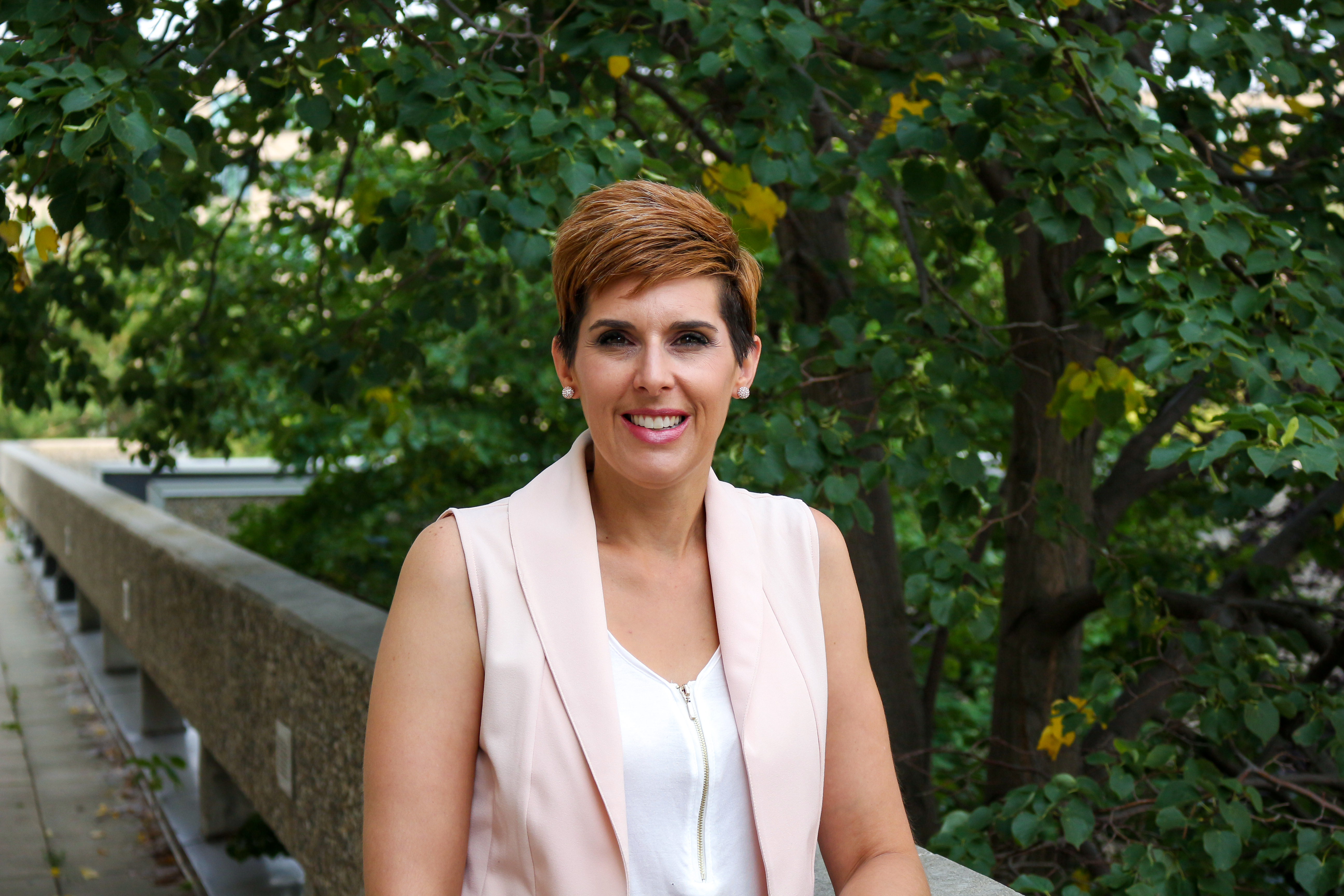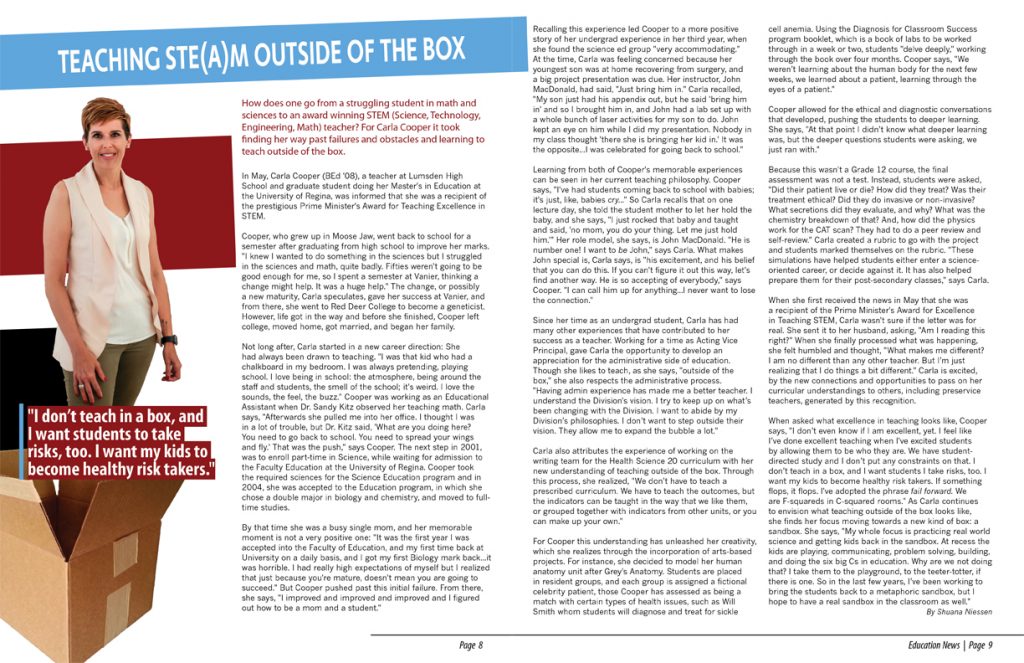
“I don’t teach in a box, and I want students to take risks, too. I want my kids to become healthy risk takers.”
How does one go from a struggling student in math and sciences to an award winning STEM (Science, Technology, Engineering, Math) teacher? For Carla Cooper it took finding her way past failures and obstacles and learning to teach outside of the box.
In May, Carla Cooper (BEd ’08), a teacher at Lumsden High School and graduate student doing her Master’s in Education at the University of Regina, was informed that she was a recipient of the prestigious Prime Minister’s Award for Teaching Excellence in STEM.
Cooper, who grew up in Moose Jaw, went back to school for a semester after graduating from high school to improve her marks. “I knew I wanted to do something in the sciences but I struggled in the sciences and math, quite badly. Fifties weren’t going to be good enough for me, so I spent a semester at Vanier, thinking a change might help. It was a huge help.” The change, or possibly a new maturity, Carla speculates, gave her success at Vanier, and from there, she went to Red Deer College to become a geneticist. However, life got in the way and before she finished, Cooper left college, moved home, got married, and began her family.
Not long after, Carla started in a new career direction: She had always been drawn to teaching. “I was that kid who had a chalkboard in my bedroom. I was always pretending, playing school. I love being in school: the atmosphere, being around the staff and students, the smell of the school; it’s weird. I love the sounds, the feel, the buzz.” Cooper was working as an Educational Assistant when Dr. Sandy Kitz observed her teaching math. Carla says, “Afterwards she pulled me into her office. I thought I was in a lot of trouble, but Dr. Kitz said, ‘What are you doing here? You need to go back to school. You need to spread your wings and fly.’ That was the push,” says Cooper. The next step in 2001, was to enroll part-time in Science, while waiting for admission to the Faculty Education at the University of Regina. Cooper took the required sciences for the Science Education program and in 2004, she was accepted to the Education program, in which she chose a double major in biology and chemistry, and moved to full-time studies.
By that time she was a busy single mom, and her memorable moment is not a very positive one: “It was the first year I was accepted into the Faculty of Education, and my first time back at University on a daily basis, and I got my first Biology mark back…it was horrible. I had really high expectations of myself but I realized that just because you’re mature, doesn’t mean you are going to succeed.” But Cooper pushed past this initial failure. From there, she says, “I improved and improved and improved and I figured out how to be a mom and a student.”
Recalling this experience led Cooper to a more positive story of her undergrad experience in her third year, when she found the science ed group “very accommodating.” At the time, Carla was feeling concerned because her youngest son was at home recovering from surgery, and a big project presentation was due. Her instructor, John MacDonald, had said, “Just bring him in.” Carla recalled, “My son just had his appendix out, but he said ‘bring him in’ and so I brought him in, and John had a lab set up with a whole bunch of laser activities for my son to do. John kept an eye on him while I did my presentation. Nobody in my class thought ‘there she is bringing her kid in.’ It was the opposite…I was celebrated for going back to school.”
Learning from both of Cooper’s memorable experiences can be seen in her current teaching philosophy. Cooper says, “I’ve had students coming back to school with babies; it’s just, like, babies cry…” So Carla recalls that on one lecture day, she told the student mother to let her hold the baby, and she says, “I just rocked that baby and taught and said, ‘no mom, you do your thing. Let me just hold him.'” Her role model, she says, is John MacDonald. “He is number one! I want to be John,” says Carla. What makes John special is, Carla says, is “his excitement, and his belief that you can do this. If you can’t figure it out this way, let’s find another way. He is so accepting of everybody,” says Cooper. “I can call him up for anything…I never want to lose the connection.”
Since her time as an undergrad student, Carla has had many other experiences that have contributed to her success as a teacher. Working for a time as Acting Vice Principal, gave Carla the opportunity to develop an appreciation for the administrative side of education. Though she likes to teach, as she says, “outside of the box,” she also respects the administrative process. “Having admin experience has made me a better teacher. I understand the Division’s vision. I try to keep up on what’s been changing with the Division. I want to abide by my Division’s philosophies. I don’t want to step outside their vision. They allow me to expand the bubble a lot.”
Carla also attributes the experience of working on the writing team for the Health Science 20 curriculum with her new understanding of teaching outside of the box. Through this process, she realized, “We don’t have to teach a prescribed curriculum. We have to teach the outcomes, but the indicators can be taught in the way that we like them, or grouped together with indicators from other units, or you can make up your own.”
For Cooper this understanding has unleashed her creativity, which she realizes through the incorporation of arts-based projects. For instance, she decided to model her human anatomy unit after Grey’s Anatomy. Students are placed in resident groups, and each group is assigned a fictional celebrity patient, those Cooper has assessed as being a match with certain types of health issues, such as Will Smith whom students will diagnose and treat for sickle cell anemia. Using the Diagnosis for Classroom Success program booklet, which is a book of labs to be worked through in a week or two, students “delve deeply,” working through the book over four months. Cooper says, “We weren’t learning about the human body for the next few weeks, we learned about a patient, learning through the eyes of a patient.”
Cooper allowed for the ethical and diagnostic conversations that developed, pushing the students to deeper learning. She says, “At that point I didn’t know what deeper learning was, but the deeper questions students were asking, we just ran with.”
Because this wasn’t a Grade 12 course, the final assessment was not a test. Instead, students were asked, “Did their patient live or die? How did they treat? Was their treatment ethical? Did they do invasive or non-invasive? What secretions did they evaluate, and why? What was the chemistry breakdown of that? And, how did the physics work for the cat scan? They had to do a peer review and self-review.” Carla created a rubric to go with the project and students marked themselves on the rubric. “These simulations have helped students either enter a science-oriented career, or decide against it. It has also helped prepare them for their post-secondary classes,” says Carla.
When she first received the news in May that she was a recipient of the Prime Minister’s Award for Excellence in Teaching STEM, Carla wasn’t sure if the letter was for real. She sent it to her husband, asking, “Am I reading this right?” When she finally processed what was happening, she felt humbled and thought, “What makes me different? I am no different than any other teacher. But I’m just realizing that I do things a bit different.” Carla is excited, by the new connections and opportunities to pass on her curricular understandings to others, including preservice teachers, generated by this recognition.
When asked what excellence in teaching looks like, Cooper says, “I don’t even know if I am excellent, yet. I feel like I’ve done excellent teaching when I’ve excited students by allowing them to be who they are. We have student-directed study and I don’t put any constraints on that. I don’t teach in a box, and I want students I take risks, too. I want my kids to become healthy risk takers. If something flops, it flops. I’ve adopted the phrase fail forward. We are F-squareds in C-squared rooms.” As Carla continues to envision what teaching outside of the box looks like, she finds her focus moving towards a new kind of box: a sandbox. She says, “My whole focus is practicing real world science and getting kids back in the sandbox. At recess the kids are playing, communicating, problem solving, building, and doing the six big Cs in education. Why are we not doing that? I take them to the playground, to the teeter-totter, if there is one. So in the last few years, I’ve been working to bring the students back to a metaphoric sandbox, but I hope to have a real sandbox in the classroom as well.”
By Shuana Niessen
Follow us on social media